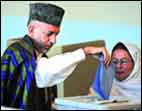by W. Patrick Lang
Sept. 20 — President Hamid Karzai on Tuesday questioned the need for further international military operations within Afghanistan, while the top U.S. military commander here predicted more fighting in the weeks ahead as Taliban guerrillas continue to mount attacks and U.S.-led forces respond.
Karzai, speaking at a news conference two days after landmark parliamentary elections were held with minimal disruption, called instead for a “stronger political approach,” focused on shutting down guerrilla training camps and financial support outside the country.” (Washington Post)
|
Hamid Karzai is an Afghan, a Pushtun to be precise. He knows that Afghanistan is a wild, high, tribal place that was created in the 19th Century by imperial Britain and imperial Russia as a convenient buffer state between the boundaries of their Asian dominions. Their purpose in doing this was simple.
The “Great Game” was being played at that time with increasing ferocity and danger of war in Central Asia. A neutral space was needed to cushion the effects of super-power competition. Domination and occupation of what is now Afghanistan had been attempted by both empires. They had found it to be an unprofitable, in some cases disastrous, enterprise. A brilliant idea emerged in Delhi, London and St. Petersburg. The conversation in these cities must have been something like this – “Let’s draw lines around this unoccupied space on the map and recognize it as a sovereign state! What shall we call it? Ah. The strongest group call themselves ‘Afghan.’ Brilliant!”
The world has “cycled” a number of times since then and in the latest turning of the wheel of history we see the recreation of an independent Afghanistan under the aegis of the West and America in particular.
We Americans see . . . Continued BELOW:
We Americans see the campaign in Afghanistan as just one theater of war in a global struggle against international Jihadism with the Moriarty-like figure of Usama bin Laden lurking in secret, somewhere. Afghanistan for us is a place to pursue his followers to the death.
|
Karzai is trying to tell us that Afghanistan is what it always was, a country made up of many ethno-religious communities, ruled at the local level by leaders whom we call “war lords” and who the Afghans know are the same as the tribal and regional figures who have always ruled this region.
We are pleased to think of Afghanistan as an emerging, centralized and globalized democratic state, but the Afghans, like Karzai, know the truth.
They know that Afghanistan is a poor, loosely knit country in which all the different factions and peoples in the country must be brought together by the “central government” in a consensus that establishes a “status quo” accepted by the local forces that will always hold the balance of power in the country.
Karzai also knows that the interests of all the foreign players must be satisfied if there is to be the modicum of quiet which would constitute “peace” in Afghanistan.
Iran, Russia, Pakistan and now the United States must all be brought into consensus before the Afghans can once again weave exquisite textiles and play “Buz Kashi” in peace with their bearded Green Beret friends.
He wants us to stop pusuing OUR dreams in Afghanistan. Our dreams are too destructive, too massively disruptive. They are interfering with his important work for internal and external reconciliation. They are interfering with a return to the real Afghanistan.
“Four Things Greater Than All Things Are; Women And Horses, and Power and War.” Rudyard Kipling writing on Afghanistan in the 19th Century.
Pat Lang
Personal Blog: Sic Semper Tyrannis 2005 || Bio || CV
Favorite Books || More BooTrib <a href="Posts
Novel: The Butcher’s Cleaver (download free by chapter, PDF format)
“Drinking the Kool-Aid,” Middle East Policy Council Journal, Vol. XI, Summer 2004, No. 2







